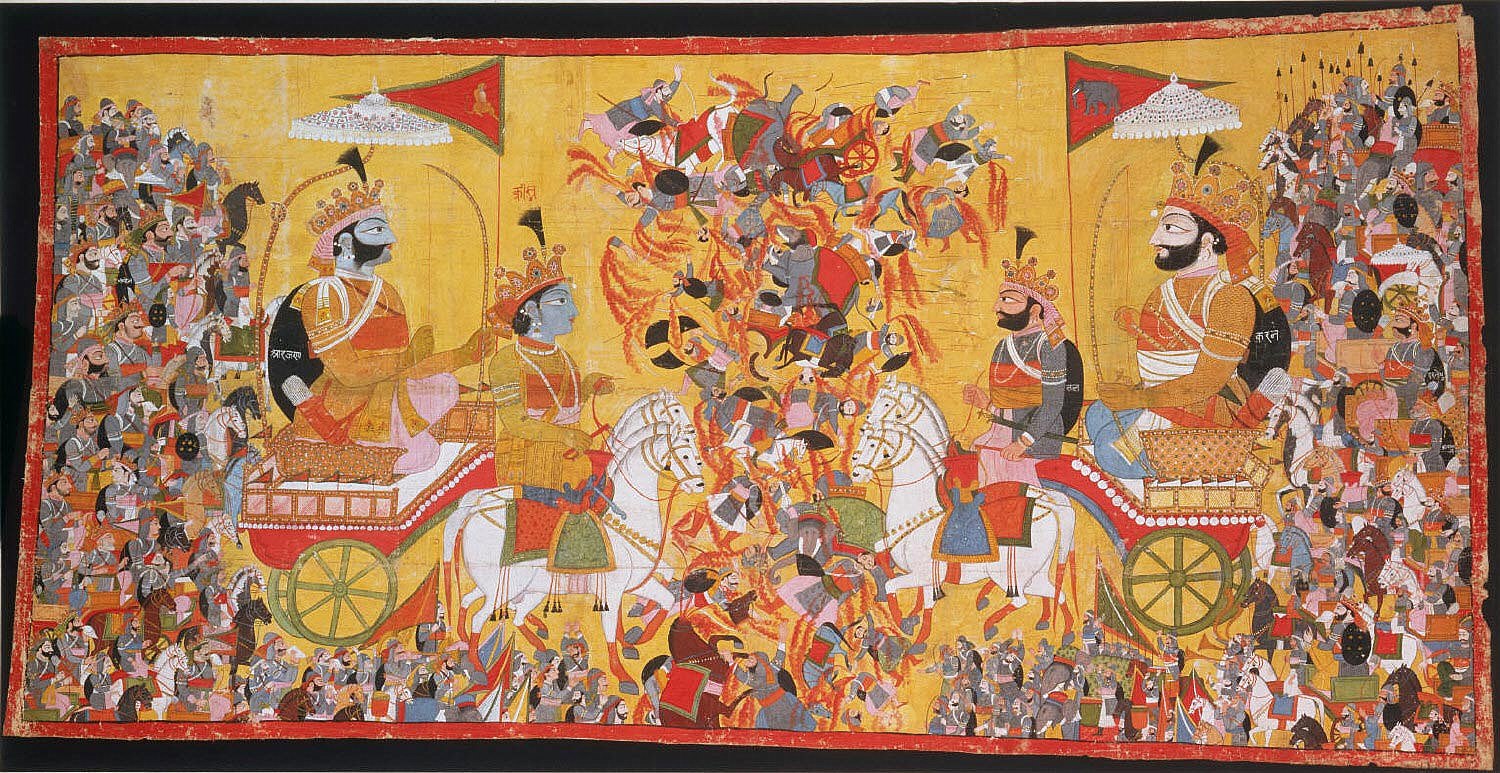What is the
difference between 'creativity' and 'innovation' ? (Don't google it, yet!) .
These words are commonly used as synonyms. As you know, both these words refer
to producing something new, physical or non-physical. And, both require a mind
that is able to think outside of what is obvious. However, though we would call
a Michelangelo or Da Vinci as creative, we would rather describe an Edison or
Marconi as innovative. So, what is the difference?
The Hindu puraana
and ithihaasa texts, commonly referred to as the Hindu mythology, are highly
acclaimed for their rich creativity. Over the many centuries, they have acted
as an undiminished source of inspiration for great works of fiction in India's
many languages. However, what is less known is the fact that the Puraana and
Ithihaasa were also products of a great innovation; an innovation that made it
possible for India to discover a lasting unity among its vast diversity.
The Hindu
civilization of Vedic time was predominantly a hunting culture where as the
indigenous civilization was more agrarian. The Hindu civilization had the Vedic
divinities, who were super humans or
symbols of various principles. As we have seen earlier, these divinities were
propitiated through the Yaaga rituals. The indigenous civilization contrarily
had no structured rituals but were full of myths, folklore and deities who
were worshiped using icons or images.
Every indigenous population in the world have had this collection of
myths. The interesting fact about myths and folklore is that they encapsulate
the learnings of a society, allowing for that knowledge to be transferred from generation to
generation in an unwritten fashion. Most of such myths also have heroes who set examples for the
society to emulate. The myths and folklore were thus another kind of Veda,
expressed in stories and not injunctions or rituals.
 The story of Veda
Vyasa, whose original name is Krishna Dvaipayana, is very interesting and
connected to the cultural confluence we discussed above. He was born to a
fisher-woman, Satyavati who was an indigenous, and the Sage Paraasara who was a
great Vedic Rishi. Vyasa was dark skinned (krishna) and was born from the
'journey in an island' (Dvaipayana). He was supposed to have been conceived by
his mother in an artificial island that the Rishi created right in the middle
of Ganga! I hope you are catching on to the symbolism here. Ganga, the river of
knowledge, had for its banks the Vedic interpretation of
the knowledge on one side and the myth based interpretation of the same
knowledge for the other. And, Sage Paraasara created this island in between the two that
Krishna Dvaipaayana claimed to be his birthplace. Coming from this 'island', he
organized the Veda into the four books, wrote a number of Puraanas and then
completed the great Ithihaasa of Maha Bharatha. The brilliance of Sage Veda Vyasa
is that he had managed to express the same philosophy in these three ways, so
different from each other! There are a number of later works like Brahma Sutra
and Srimad Bhagavatha that are attributed to Veda Vyasa, but they are very
unlikely to be the works of the same person who wrote the Maha Bharatha and
organized the Vedas.
The story of Veda
Vyasa, whose original name is Krishna Dvaipayana, is very interesting and
connected to the cultural confluence we discussed above. He was born to a
fisher-woman, Satyavati who was an indigenous, and the Sage Paraasara who was a
great Vedic Rishi. Vyasa was dark skinned (krishna) and was born from the
'journey in an island' (Dvaipayana). He was supposed to have been conceived by
his mother in an artificial island that the Rishi created right in the middle
of Ganga! I hope you are catching on to the symbolism here. Ganga, the river of
knowledge, had for its banks the Vedic interpretation of
the knowledge on one side and the myth based interpretation of the same
knowledge for the other. And, Sage Paraasara created this island in between the two that
Krishna Dvaipaayana claimed to be his birthplace. Coming from this 'island', he
organized the Veda into the four books, wrote a number of Puraanas and then
completed the great Ithihaasa of Maha Bharatha. The brilliance of Sage Veda Vyasa
is that he had managed to express the same philosophy in these three ways, so
different from each other! There are a number of later works like Brahma Sutra
and Srimad Bhagavatha that are attributed to Veda Vyasa, but they are very
unlikely to be the works of the same person who wrote the Maha Bharatha and
organized the Vedas.
Just as the Ganga flowed down from the
northern plains, the civilization of the Hindus flowed to the south and east of
India, nurturing the land and letting the population quench their thirst for
knowledge. These were the times when imagination literally caught fire and a
number of works with excellent stories came into being. In total, there are 18
puraanas including Vishnu Puraana, Siva Puraana, Padma Puraana, Skanda Puraana
etc. They are complemented by the two Ithihaasa, Maha Bharatha and Ramayana.
The path of Bhakti or devotion took its initial roots at this time though it
came to its culmination much later, closer to 10th century CE.
But there was
another greater Sun that had stated shining in India at the time, one who
brought back philosophical thinking into prominence once again, though in the
name of a different religion. More on the times of philosophy including Budhism in the next post.
Meanwhile, please find some good puraana stories to read and enjoy. I can bet that they will beat the Harry Potter stories any day!
No comments:
Post a Comment